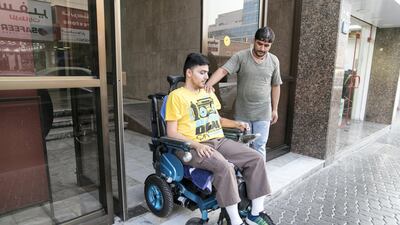Improving airport facilities for the disabled will encourage more people in the UAE with special needs to travel, campaigners said.
Building more ramps and improving airport staff training could boost the confidence of those worried about navigating busy international terminals.
The advice from disability groups came as the government announced new measures to improve the flying experience for people with special needs.
The initiative was agreed between the UAE and Saudi Arabia as part of plans to encourage greater economic, social and military integration between the two states.
“What hinders people of determination from travelling is fear,” said Amal Yousuf Baker, the mother of Emirati artist Abdullah Lutfi, who has autism.
“Keeping their needs in mind will give their families and themselves the courage to travel.
“It would encourage us [families and carers] to let go because we need to give them the space to be on their own.”
On Saturday, the Executive Committee of the Saudi-Emirati Co-ordination Council announced a seven-step strategy to further cement ties between the nations.
Key components included fast-track customs facilities at ports, more support for small and medium-sized enterprises operating in both countries, and improved access for the disabled at airports.
“The initiative seeks to enhance the experience of people of determination by ensuring the compliance of disabled-friendly airports in both countries,” the government’s news agency Wam reported.
_______________
Read more:
UAE and Saudi Arabia unveil seven point co-operation plan including new cryptocurrency
UAE employers not hiring disabled staff because they're 'too expensive', survey shows
Joined-up strategy by hotels, tourism and transport chiefs needed to ensure disabled access
_______________
Speaking to The National on Sunday, Mansha Budhrani, whose son Sharan Anil has muscular dystrophy, welcomed the scheme.
She agreed that providing more training for airport staff about the needs of those with disabilities would improve trust and encourage more people to travel.
"We need more than just one ramp when we enter an airport and there should be adequate space to manoeuvre a wheelchair," Ms Budhrani said.
“There also needs to be more awareness about different kinds of disabilities. People should be better trained to understand that some people in wheelchairs cannot move at all.”
Last year, Dubai International Airport welcomed its billionth passenger since it first became operational in 1960.
Alongside Abu Dhabi's international terminal, the two airports are both considered world-class facilities.
But Renate Baur-Richter, programme manager at the Sedra Foundation in Abu Dhabi, which works to promote disability-friendly environments, said that despite their success there was always more room for improvement.
“The UAE is at the forefront of better access but there is room for improvement in the Middle East,” she said.
“The ultimate goal of a person with determination is to be recognised as an independent traveller and not as just another case.
“Every step towards an accessible airport makes a more accessible GCC. This will increase the independence of people of determination and also the elderly.”

